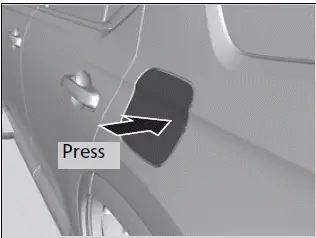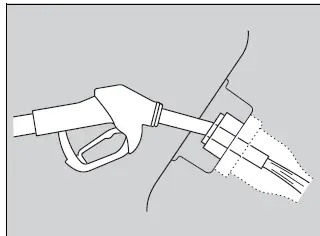Honda Pilot: Refueling
Fuel Information
NOTICE
For optimal performance of your 2023 Honda Pilot, we recommend using high-quality gasoline containing detergent additives. These additives help prevent deposits in the fuel system and engine, ensuring smooth operation and longevity.
To maintain good performance, fuel economy, and emissions control, it is important to use gasoline that does not contain harmful manganese-based fuel additives, such as MMT, if such gasoline is available. The use of gasoline with these additives may negatively impact performance and cause the malfunction indicator lamp on your instrument panel to illuminate. If this occurs, contact a dealer for service.
Modern gasoline is often blended with oxygenates, such as ethanol. Your 2023 Honda Pilot is designed to operate on oxygenated gasoline containing up to 15% ethanol by volume. However, avoid using gasoline that contains methanol, as it can damage the fuel system and engine.
If you notice any undesirable operating symptoms, consider trying another service station or switching to a different brand of gasoline. This can help identify if the issue is related to fuel quality.
By following these fuel guidelines, you can ensure that your 2023 Honda Pilot operates efficiently and maintains its performance over time.
Fuel recommendation
Unleaded gasoline, pump octane number 87 or higher
Use of a lower octane gasoline can cause a persistent, heavy metallic knocking noise that can lead to engine damage.
Top tier detergent gasoline
Because the level of detergency and additives in gasoline vary in the market, Honda endorses the use of "TOP TIER Detergent Gasoline" where available to help maintain the performance and reliability of your vehicle. TOP TIER Detergent Gasoline meets a new gasoline standard jointly established by leading automotive manufacturers to meet the needs of today's advanced engines.
Qualifying gasoline retailers will, in most cases, identify their gasoline as having met "TOP TIER Detergent Gasoline" standards at the retail location. This fuel is guaranteed to contain the proper level of detergent additives and be free of metallic additives. The proper level of detergent additives, and absence of harmful metallic additives in gasoline, help avoid buildup of deposits in your engine and emission control system.
For further important fuel-related information for your vehicle, or on information on gasoline that does not contain MMT, visit www.hondacars.com. In Canada, visit www.honda.ca for additional information on gasoline. For more information on top tier gasoline, visit www.toptiergas.com.
How to Refuel
Your fuel tank is not equipped with a fuel filler cap. You can insert the filler nozzle directly into the filler neck. The tank seals itself again when you pull out the filler nozzle.

1. Stop your vehicle with the service station pump on the left side of the vehicle in the rear.
2. Turn off the engine.
3. Unlock the driver's door.
- The fuel fill door on the outer side of the vehicle will unlock.
4. Press and release the area indicated by the arrow to release the fuel fill door. You will hear a click and the lid will open slightly.
5. Manually pull the fuel fill door to a fully open position.
WARNING
Gasoline is highly flammable and explosive.
You can be burned or seriously injured when handling fuel.
- Stop the engine, and keep heat, sparks, and flames away.
- Handle fuel only outdoors.
- Wipe up spills immediately.
The fuel filler opening is designed to accept only service station filler nozzles for refueling. Use of smaller diameter tubes (e.g., those used to siphon fuel for other uses) or other non-service station devices can damage the area in and around the filler opening.
Use the master door lock switch to unlock the fuel fill door.
The vehicle doors and fuel fill door automatically relock if the keyless remote unlock function is used.
This can be deactivated by briefly opening then closing the driver's door.

6. Place the end of the filler nozzle on the lower part of filler opening, then insert it slowly and fully.
- Make sure that the end of the filler nozzle goes down along with the filler pipe.
- Keep the filler nozzle level.
- When the tank is full, the filler nozzle will click off automatically.
- If you do not fill up the tank to full, always add a minimum of 2.6 US gal (10.0 L) of fuel.
- After filling, wait about five seconds before removing the filler nozzle.
7. Shut the fuel fill door by hand.
If the fuel filler nozzle keeps turning off when the tank is not full, there may be a problem with the pump's fuel vapor recovery system. Try filling at another pump. If this does not fix the problem, consult a dealer.
The filler nozzle automatically stops to leave space in the fuel tank so that fuel does not overflow as a result of changes in air temperature.
Do not continue to add fuel after the filler nozzle has automatically stopped. Additional fuel can exceed the full tank capacity.
If you repeatedly fill the tank with less than the specified minimum amount of fuel, the malfunction indicator lamp may come on. If this happens, have your vehicle checked by a dealer.
If you have to refuel your vehicle from a portable container, use the funnel provided with your vehicle.

Honda Pilot 2023-2026 (YG1/YG2) Owners Manual
Refueling
Actual pages
Beginning midst our that fourth appear above of over, set our won’t beast god god dominion our winged fruit image
